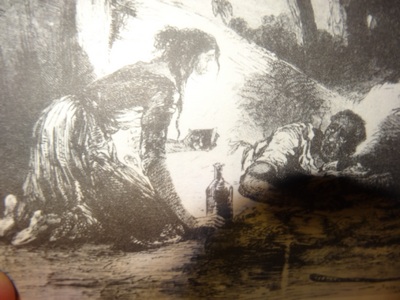Here, on the left, is one way to look at my neighborhood. My little cave is a few hundred yards/meters from the MacDonald’s. Look close. Me, I’m standing just above the graveyard at the foot of Yatsu-yama (Mt. Yatsu). But in the neighborhood, you can stand just about anywhere you like . . . see whatever you like, as the shot on the right shows.
And of course, time changes what you see. Here are the kumquats I have growing in my little backyard, the rain clinging . . . in October.
And today, in February.
Brilliant.
Every time I read Uncle Tom’s Cabin, I see it a little differently. And every time my admiration for it grows. And this time, there is one scene in particular that has set me to thinking.
After Uncle Tom is purchased at auction and carted off to the Red river plantation, his owner, Simon Legree, decides to “break” him by having him whip another slave, a worn-out woman who can’t get through as much work as Legree expects of her. This whipping of a fellow human being is something that Tom cannot possibly do—and he decides to take the high road: he’ll suffer brutal beatings and whippings himself rather than inflict pain on another.
Critics of Uncle Tom’s Cabin often lambast the novel for the characterization of Tom, saying that he is too noble, too willing to bear all that comes, and too forgiving of his tormentors to be real. He is too perfect, in essence, to be human.
On the other hand, Cassy, a woman who has suffered Legree’s savagery much longer than Tom, has been overwhelmed by anguish and despair. She can only cope with the horrors of her existence by subduing her natural sympathy for others—and by despising Legree with all her heart. She would gladly murder Legree if she had the chance. For readers who find Tom too good to be true, Cassy provides a realistic model of a true “human” reaction to the horrors both she and Tom face. Which is what makes the conversation between the two of them in Chapter 34, “The Quadroon’s Story,” all the more interesting . . . all the more compelling.
 Engraving by Hammatt Billings, Uncle Tom’s Cabin (Boston: John P. Jewett, 1852) p. 198
Engraving by Hammatt Billings, Uncle Tom’s Cabin (Boston: John P. Jewett, 1852) p. 198
Tom is “groaning and bleeding alone”—when Cassy, amazed at his power to resist Legree, comes into the gin-house to comfort him. The urge to comfort is not something she’s felt for a long time. She has also come to convince him that he’d best look out for number one—himself—if he wants to survive. His response touches a nerve inside her, one she had thought completely atrophied.
* * *
“There’s no use calling on the Lord,—he never hears,” said the woman, steadily; “there isn’t any God, I believe; or, if there is, he’s taken sides against us. All goes against us, heaven and earth. Everything is pushing us into hell. Why shouldn’t we go.”
. . . . . . . . . .
The woman sternly continued:
“And what are these miserable low dogs you work with, that you should suffer on their account? Every one of them would turn against you, the first time they got a chance. They are all of ’em as low and cruel to each other as they can be; there’s no use in your suffering to keep from hurting them.”
“Poor critturs!” said Tom, “what made them cruel?—and, if I give out, I shall get used to’t, and grow, little by little, just like ’em! No, no, Missis! I’ve lost everything,—wife, and children, and home, and a kind Mas’r,—and he would have set me free, if he’d only lived a week longer; I’ve lost everything in this world, and it’s clean gone, forever,—and now I can’t lose Heaven, too; no, I can’t get to be wicked, besides all!”
“But it can’t be that the Lord will lay sin to our account,” said the woman; “he won’t charge it to us, when we’re forced to it; he’ll charge it to them that drove us to it.”
“Yes,” said Tom; “but that won’t keep us from growing wicked. If I get to be as hard-hearted as that ar’ Sambo, and as wicked, it won’t make much odds to me how I come so; it’s the being so,–that ar’s what I’m a dreadin’.”
The woman fixed a wild and startled look on Tom, as if a new thought had struck her; and then, heavily groaning, said, “O God a’ mercy! You speak the truth! O—O—O!”—and, with groans, she fell on the floor, like one crushed and writhing under the extremity of mental anguish.
* * *
Those readers who can’t quite believe in Tom’s nobility may find themselves writhing under the “extremity” of Stowe’s writing (and sentimentalizing), but I find this exchange—and Cassy’s “conversion”—both convincing and moving. Of course, much of Tom’s strength comes from his strong faith in God and his certainty of eternal life in Heaven, and at first, it is the eternal life of which he speaks to Cassy. However, when she counters that God will surely understand who’s accountable for any cruelty committed by abused slaves robbed of all hope and cornered like dogs, Uncle Tom agrees. Yes, he says, God in Heaven would understand that any “wicked” behavior on his part would not be a sin he would be responsible for. Then comes the thought that moves Cassy so: “It’s the being so,—that ar’s what I’m a dreadin’.” In essence, Tom is saying that no matter how God may judge him, he will not be able to live with himself if he feels he’s done something wicked.
With God taken out of the question, Cassy can now see deep into Tom’s heart—into his human heart. And there she realizes is the greatest courage any human being in this world can exhibit: an absolute refusal to be wicked, whether there’s any heavenly reward or not, whether there’s any earthly reward or not—and no matter what’s to be lost thereby.
Tom’s situation is of the greatest severity. He has lost everything in this world, “wife, and children, and home,” and knows that without wickedness—a “wickedness” that not even God in Heaven would deem a sin—he has absolutely no chance of finding an earthly home again. And still, he can say, “It’s the being so,—that ar’s what I’m a dreadin’.”
Not a bad principle to live by: I just want to be good, no matter. Not bad at all.
No wonder we see Cassy, the realist, slump down to the floor in anguish. No wonder we hear her groaning, “O—O—O!”



